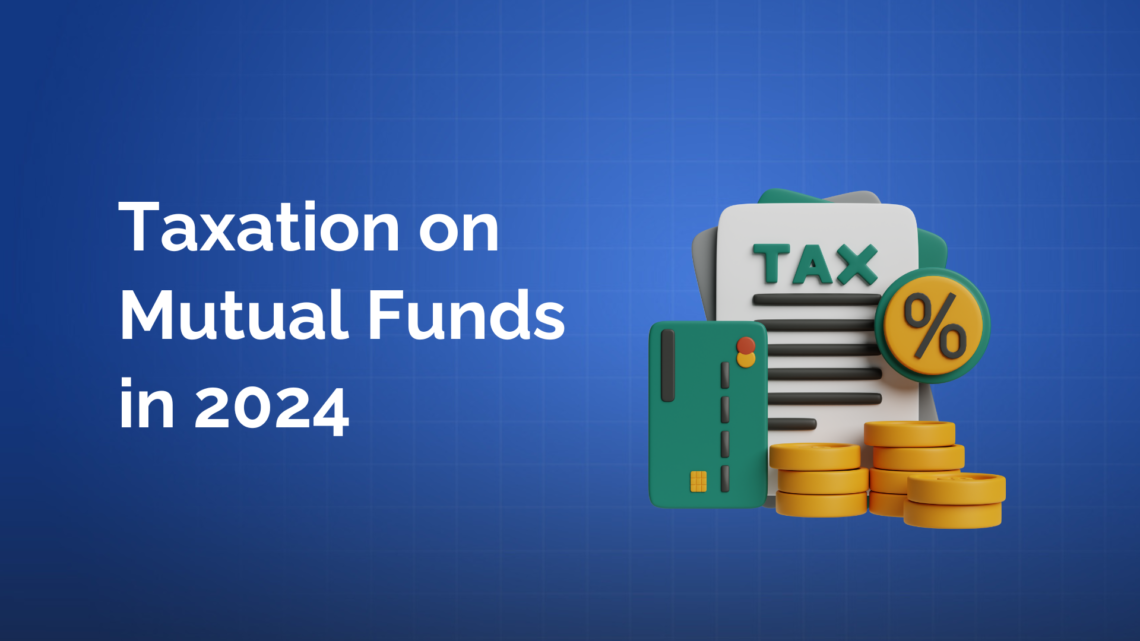Table of Contents
When you invest in mutual funds, you expect the market to dictate your returns, but what if there is an unexpected partner who’s eating up a share—taxation on mutual funds?
In 2024, taxation rules are more crucial than ever in determining your final take-home profits from mutual funds. Whether you’re an equity enthusiast or prefer the stability of debt funds, taxes impact your gains differently.
Investing in mutual funds without considering taxation is like swimming in an ocean without knowing which direction to swim in.
Let’s take a real-world scenario: An investment of ₹10 lakh in a debt fund held for two years could see gains taxed at your income slab rate, eating away up to 30% of your earnings. Compare that with an equity fund held for the same period, and the difference in tax liability becomes striking. Small but essential distinctions like these can make a massive difference over time.
This blog will explain taxation in a way that’s easy to understand and provide actionable insights into reducing your tax burden. Are you ready to keep more of your profits?
Factors to Determine Tax on Mutual Funds
Many investors tend to overlook the taxation part, as their focus remains on earning higher profits. To determine the tax on mutual funds, an investor has to consider many factors before selecting a type of mutual fund. Let’s look at some of them.
Types of Funds
Mutual funds are broadly categorized into equity funds, debt funds, hybrid funds, solution-oriented funds, and Other categories.
Equity funds are further divided into subcategories. For example, there are many types of equity funds, such as large-cap funds, mid-cap funds, and flexi-cap funds. Hybrid funds are subdivided into multi-asset funds, balanced advantage funds, and arbitrage funds.
The taxation rules applied to different categories of schemes are different. They vary based on their asset exposure, such as equity-oriented funds, debt-oriented funds, and non-equity-oriented funds (gold, international, REITs, Invits, etc.).
Dividend
Dividends are a part of the profits that a mutual fund scheme accumulates over time. Mutual fund houses distribute dividends quarterly, semi-annually, or annually. Investors don’t need to sell their units to get dividend income.
Capital Gains
When an investor sells their shares at a higher price than their buying price, they realize profits, which are termed capital gains. Depending on the investor’s holding period, these can be either short-term or long-term capital gains.
Holding Period
The holding period is the time an investor stays invested in a mutual fund. Taxation on mutual funds directly depends on the duration of the holding period. Generally, higher holding periods attract lower tax burdens, encouraging investors to invest for long-term periods.
How do you earn profits in Mutual Funds?
Mutual funds generate profit for investors either in the form of capital gains or dividend income.
Capital gains are the profits realized from selling a mutual fund scheme, generally at a NAV higher than the NAV it had at the time of purchase.
For example, if an investor purchases a mutual fund at an NAV of Rs. 100 and holds it for two years to sell it at a NAV of Rs. 140, the capital gain realized would be 40% of the invested amount (as the NAV rose by 40%).
Taxes are due only when investors plan to sell their mutual fund units. According to the holding period, taxation will be classified as STCG or LTCG. Therefore, when investors hold their investments for the long term, they defer their tax liability, as the investor has to pay tax only at the time of redemption.
Another way a mutual fund scheme rewards investors is by distributing regular dividends, but these are not mandatory and are paid from the fund’s accumulated surplus. They are at the fund’s discretion and not mandatory.
Dividends distributed are also subject to taxation. We will discuss in detail the old and new taxation regulations for both capital gains and dividend income.
Taxation of Dividends Provided by Mutual Funds
The Finance Bill amendment in Union Budget 2020 made a major change in the taxation of dividends. The Finance Act 2020 eliminated Dividend Distribution Tax (DDT), which was earlier deducted by fund houses when announcing dividends. Investors were exempt from paying taxes on dividend income from mutual funds until March 31, 2020.
After the amendment, the entire dividend income is taxable in the investor’s hands as per the income tax slab bracket. It should be treated under the heading “income from other sources” while calculating taxable income.
As per the changed rules, dividend income is also subject to TDS (tax deducted at source). Mutual fund houses are required to deduct 10% TDS u/s 194K if the total dividend paid to an investor exceeds ₹5,000 during a financial year.
When paying taxes, investors can claim 10% TDS and pay the remaining balance.
Taxation of Capital Gains Provided by Mutual Funds
The tax on capital gains arising from the redemption of mutual fund schemes depends mainly on two criteria: the type of mutual fund scheme and the holding period.
Mutual funds classified as equity-oriented mutual funds must have an equity exposure of at least 65% in equity instruments. Investors selling after holding for more than 12 months will incur taxation as LTCG, and those below 12 months will be considered STCG.
Debt-oriented schemes have a completely different taxation structure. These funds invest a minimum of 65% in SEBI-regulated debt instruments.
In the Union Budget 2024, the government revised the holding period for debt-oriented schemes. A holding period of 24 months will be classified as LTCG, down from the previous 36 months.
Non-equity-oriented schemes are those that neither fall under the equity category (equity allocation above 65%) nor the debt category (equity allocation below 35%, debt allocation above 65%). Depending on the fund manager, they have a dynamic equity exposure between 35% and 65%. Such mutual funds have a holding period of 24 months to consider LTCG taxation.
Budget 2024 changes that mutual fund investors should know
The Union Budget 2024 revised the taxation on capital gains and the classification of STCG and LTCG based on the holding period.
Prior to this, STCG from equity-oriented schemes was subject to tax at 15% if held for less than one year and 10% LTCG for investments held above one year. LTCG tax applies only to gains exceeding 1.5 lakhs per annum.
If a debt mutual fund is sold within 36 months, it will be classified as STCG, and if held for more than 36 months, it will be deemed LTCG. Irrespective of the holding period, capital gains arising from debt mutual funds will be added to the investor’s income and taxed as per the income tax slab bracket under which the investor falls.
Also Read: Top 10 Mutual Funds to Watch After Union Budget 2024.
Major changes in capital gains taxation in Budget 2024:
- In Union Budget 2024, holding periods to qualify for LTCG for non-equity assets were revised from 36 months to 24 months.
- The Union Budget 2024 removed the 20% indexation benefit for debt mutual funds purchased before April 1, 2023.
- Long-term capital gains are at 12.5% for all asset classes, according to the holding periods. This change was done to simplify taxation across all asset classes.
- Long-term capital gains on equity ETFs, gold ETFs, international ETFs, and international foreign funds (domestic) will now be taxed at 12.5% if held for more than 12 months.
The table below shows the new taxation rule based on the asset class and holding period after the changes made in Union Budget 2024.
| Types of Mutual Funds | Holding Period (STCG) | Holding Period (LTCG) | Tax Rate (STCG) | Tax Rate (LTCG) |
|---|---|---|---|---|
| Equity oriented Mutual Funds and ETFs | Less than 12 months | More than 12 months | 20% | 12.50%* |
| Debt oriented Funds & ETFs (purchased before April 1, 2023) | Less than 24 months | More than 24 months | Income Tax Slab rate | 12.50% w/o Indexation |
| Debt oriented Funds & ETFs (purchased after April 1, 2023) | Always short-term | Always short-term | Income Tax Slab rate | Income Tax Slab rate |
| Gold Mutual Funds | Less than 24 months | More than 24 months | Income Tax Slab rate | 12.50% w/o Indexation |
| Gold ETFs | Less than 12 months | More than 12 months | Income Tax Slab rate | 12.50% w/o Indexation |
| International Mutual Funds | Less than 24 months | More than 24 months | Income Tax Slab rate | 12.50% w/o Indexation |
| International ETFs | Less than 12 months | More than 12 months | Income Tax Slab rate | 12.50% |
| Equity Fund of Funds (FoF) | Less than 12 months | More than 12 months | 20% | 12.50% |
| International Fund of Funds (FoF) | Less than 24 months | More than 24 months | Income Tax Slab rate | 12.50% w/o Indexation |
| Aggressive Hybrid Funds (Equity allocation above 65%) | Less than 12 months | More than 12 months | 20% | 12.50% |
| Conservative Hybrid Funds (Debt allocation above 65%, purchased before April 1, 2023) | Less than 24 months | More than 24 months | Income Tax Slab rate | 12.50% |
| Conservative Hybrid Funds (Debt allocation above 65%, purchased after April 1, 2023) | Always short-term | Always short-term | Income Tax Slab rate | Income Tax Slab rate |
| Dynamic Hybrid Funds (Equity allocation b/w 35% to 65%) | Less than 24 months | More than 24 months | Income Tax Slab rate | 12.50% w/o Indexation |
# The New rule applies as of April 1, 2025. Redemptions made before will be taxed at your slab rate.
Note: Investments made in debt-oriented funds before March 31, 2023, will have STCG taxation as per the income tax slab rate and LTCG of 12.5% without indexation benefits.
The Bottom Line
Taxation on mutual funds can be complex if you are not familiar with financial terms and calculations; however, it may not be that complicated if you consider the holding periods and type of assets you invest in.
Another fundamental rule is that the longer you stay invested for the long term, the longer you defer the liability to pay taxes. Hence, it becomes more tax-efficient. Taxes on short-term investments are higher than those on long-term investments.
How do you calculate tax on mutual funds?
The tax on mutual funds depends on the type of asset class and holding period. Only ELSS funds qualify for a tax deduction of ₹1,50,000 under section 80C.
How much income from a mutual fund is tax-free?
Long-term capital gains for equity-oriented schemes are tax-free up to a limit of 1.25 lakhs per annum. In the Union Budget 2024, the exemption limit has been increased from ₹1 lakh to 1.25 lakh.
Is SIP in mutual funds tax-free?
No, SIPs (systematic investment plans) in mutual funds are not tax-free. The taxation depends on the type of mutual fund you invest in and the duration of your investment. Tax implications apply to each SIP installment individually based on the holding period.










